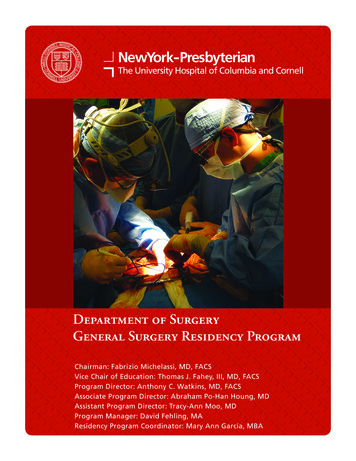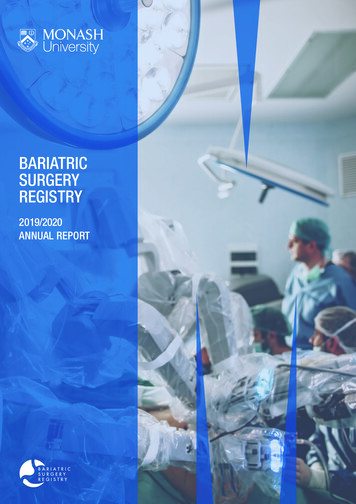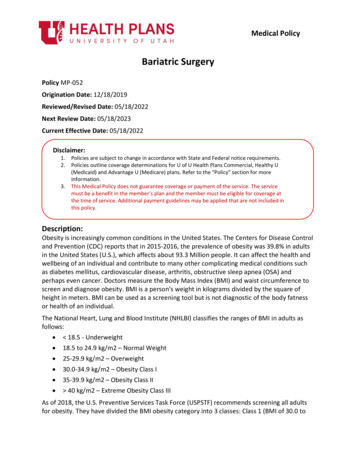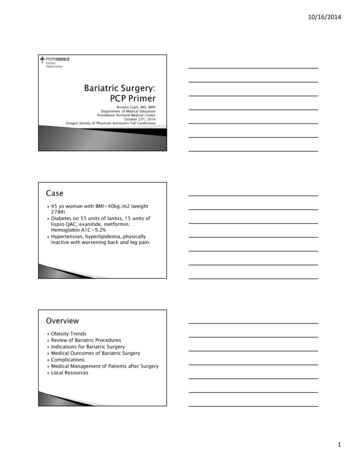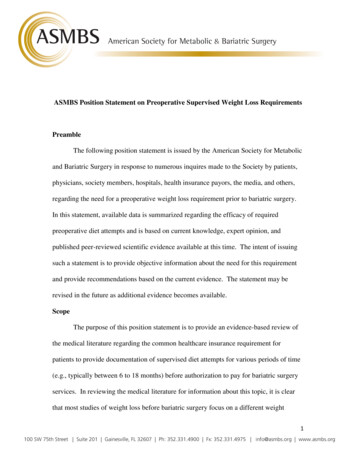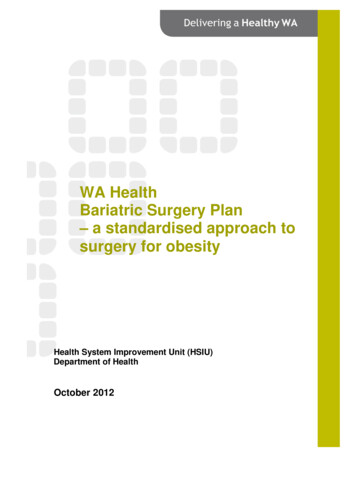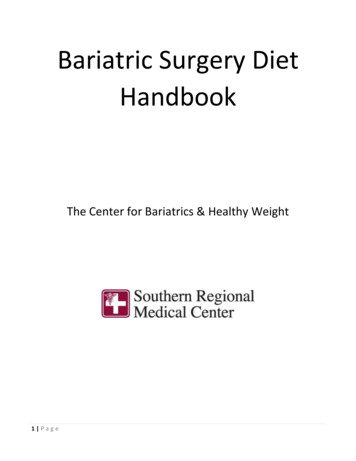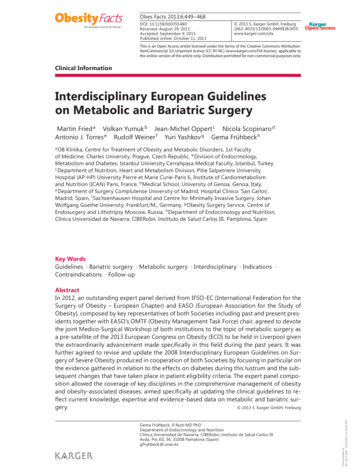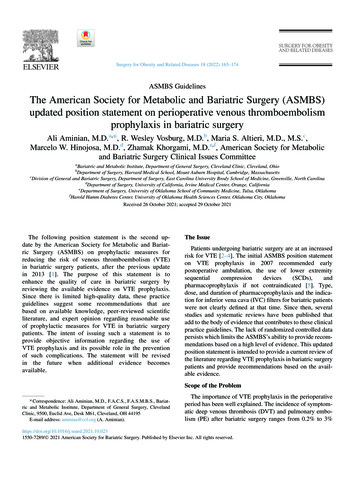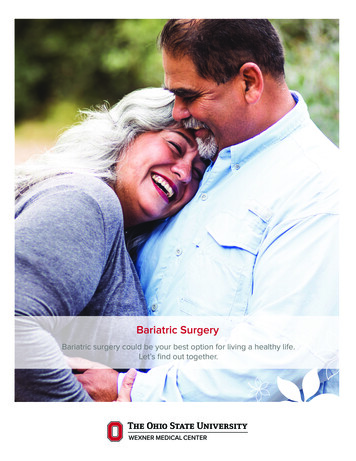
Transcription
Bariatric SurgeryBariatric surgery could be your best option for living a healthy life.Let’s find out together.1
What is obesity?Obesity is a complex health issue, characterized by an excessive amount of body fat. Itresults from a combination of causes and factors, including genetics, dietary patterns,lack of physical activity and medication use.Obesity is a serious disease associated with increased risk of diabetes, heart disease,stroke, arthritis and some cancers, as well as poorer mental health outcomes andreduced quality of life. It affects more than one-third of U.S. adults and is the secondleading cause of preventable death.What is my body mass index?Body mass index, or BMI, is used as a screening tool for obesity. BMI is a measure of sizebased on the mass and height of an individual.BMI can be determined on the following chart:For example: Height 5’6” Weight 250 lbs. BMI Range 40 – 45 (Obese)– If your BMI is 18.5 to 24.9, it falls within the healthy range.– If your BMI is 25.0 to 29.9, it falls within the overweight range.– If your BMI is 30.0 or higher, it falls within the obese range.BMI can be used as a screening tool, but it does not give us a complete picture of a person’shealth. A trained healthcare provider should perform a health assessment to evaluate yourhealth status and risks.2
What is bariatric surgery?Bariatric surgery is a weight-loss tool thatchanges the anatomy of the gastrointestinaltract (stomach and digestive system) andcreates changes in the body that alter energybalance and fat metabolism.Bariatric surgery is not a cosmetic procedure.While you will lose weight, the successof bariatric surgery should be based on areduction of medical problems associated withobesity (known as comorbidities), improvedspan of life and improved quality of life.How can bariatric surgery helpchronic medical conditions?When combined with a comprehensivetreatment plan (including nutrition, exerciseand behavior changes), bariatric surgery is aneffective tool for long-term weight loss andenhanced health. Frequently, individuals wholose weight find themselves needing fewermedications to treat obesity-related conditionssuch as: Arthritis Sleep apnea High blood pressure High cholesterol Type 2 diabetes Venous stasis disease (poor circulation) Soft tissue infectionsOn average, patients who have bariatricsurgery also have lower rates of prematuredeath caused by heart disease, stroke,diabetes and cancer.Who is a candidate for bariatricsurgery?Bariatric surgery is usually recommended onlyto people with severe obesity who have notbeen able to maintain meaningful weight lossthrough diet, exercise or medication.Some requirements for bariatric surgeryinclude: BMI at least 40, or more than 100 poundsoverweight BMI of 35 to 39.9, and one or more obesityrelated comorbidities, such as type 2diabetes, hypertension, sleep apnea andother respiratory disorders, nonalcoholicfatty liver disease, osteoarthritis, lipidabnormalities, gastrointestinal disorders orheart disease Failed attempts to lose weight or maintain ahealthy weight range over several monthsor yearsSome insurance carriers may have additionalrequirements. Please check with yourinsurance company.3
What surgical optionsare available?Everyone has their own medical historyand lifestyle. Open and honest conversationswith your care team and providers will helpyou choose the procedure that best fitsyour personality and needs.The Ohio State University Wexner MedicalCenter Bariatric Surgery Program offersthe following bariatric procedures:ROUX-EN-Y GASTRIC BYPASSA Roux-en-Y gastric bypass is a restrictive andmalabsorptive surgical procedure that keepsyou from eating a lot of food at one time andabsorbing everything you eat. Through thissurgery, a 1 to 1½-ounce pouch, about thesize of an egg, is made from the stomach andconnected to a rerouted portion of the smallintestine, changing the digestive pathway ofthe food you eat.Benefits Roux-en-Y results in greater weight loss onaverage; 60% to 85% of excess weight islost within 24 months after surgery More successful at helping patients improveweight-related conditions such as diabetesSLEEVE GASTRECTOMYA sleeve gastrectomy is a restrictive, surgicalweight-loss procedure that limits the amountof food you can eat and helps you feel fullsooner. In this procedure, a thin, verticalsleeve of stomach is created, and the rest ofthe stomach is removed. The sleeve is aboutthe width of a garden hose.4Benefits Patients lose about 60% to 70% of excessbody weight within 24 monthsof surgery The procedure does not limit a patient’sability to absorb certain sugars, fats,proteins or vitamins from foodThere are other surgical options available thatour surgeons can recommend on a case-bycase basis.These include: revision surgery adjustable gastric band procedure stomach intestinal pylorus-sparing (SIPS)surgery intragastric balloon procedure (performedthrough endoscopy)
Procedure Comparison ChartGASTRIC BYPASS(ROUX-EN-Y)SLEEVE GASTRECTOMYLength of SurgicalProcedure11/2 to two hoursOne hourLength of Hospital StayOne to two daysOne to two daysTypical Recovery TimeTwo to four weeksTwo to four weeksProcedure ReversibilityNoneNoneQUALIFIERSGASTRIC BANDINGDumping(diarrhea and sweatingPossibleNonecaused by largeamounts of sugar)Rate of Weight LossFastest weight lossQuick weight lossMandatory VitaminsYesYesNo aspirin or similarmedicationsNo medicationrestrictionsLiquid diet for two weeksLiquid diet for one monthMedication RestrictionsDiet RestrictionsStart your surgical weight-loss journey atthe Ohio State Wexner Medical Center!Step 1: Attend an Information SessionIf you think bariatric surgery sounds like a good option for improving your life, we’d like totell you more about it! Join us for a free information session, where you can: Learn about the benefits of having bariatric surgery at the medical centerMeet members of our clinical support teamLearn about surgery options and ask questionsHear from and about successful bariatric surgery patientsReceive an application packet for weight-loss surgeryOur in-person information sessions are held monthly in The Ohio State University Wexner Medical Center Martha Morehouse Outpatient Care Pavilion auditorium, 2050 KennyRoad, Columbus, OH 43221. Parking is free.To register for an in-person session, sign up online at wexnermedical.osu.edu/bariatricsor call 614-366-6675. We have an online information session option, too. View it atwexnermedical.osu.edu/bariatrics.5
Step 2: Call Your Insurance ProviderYour insurance provider can help you determine if bariatric surgery is a coveredbenefit. Contact your insurance provider by calling the number on the back of yourinsurance card and ask: If bariatric surgery is a covered benefit If The Ohio State University Wexner Medical Center is covered in your network AND If our surgeons are participating providers in your network- If Ohio State is out of network, ask if you have out-of-network benefits If you need a referral from your primary care physician or insurance preauthorizationprior to starting your journeyIf your insurance does not cover the surgery, self-pay options are available as follows:GASTRIC BYPASS (Roux-en-Y)CPT Code: 43644Self-Pay Cost: 19,750SLEEVE GASTRECTOMYCPT Code: 43775Self-Pay Cost: 17,200Step 3: Begin a Weight Management ProgramEach insurance provider has different requirements that must be met before approvingyour bariatric surgery. Some require you to complete a weight management programfor a specific amount of time before they will grant approval. You are encouraged tospeak with your insurance company and meet with your primary care provider to getthis process started as soon as possible.Step 4: Complete Your Application PacketThe application packet is a necessary step of the journey and is very detailed; youmust list the ways you have tried to lose weight in the past, including diets and weightloss programs, as well as any prior surgeries.You will obtain your application packet during the bariatric information session.Once this packet is complete, please email it to ObesitySurgery@osumc.edu.You can also mail it to:Or fax it to:Martha Morehouse Outpatient Care2nd Floor Pavilion, Suite 25002050 Kenny RoadColumbus, OH 43221614-366-8166Step 5: Schedule Your Bariatric CounselingAll candidates for bariatric surgery at the Ohio State Wexner Medical Center are referred for consultation with a psychologist. During this appointment, a psychologist willreview and interpret a few tests to learn more about you and the ways you cope withlife events and stress. You and the psychologist will also discuss your current and pastlifestyles and how weight has affected your decisions. This is a required part of theprocess and will help us make sure you are successful before and after surgery.6
Step 6: Schedule Your Dietary and Medical ConsultationsOnce we’ve received your application and scheduled your bariatric counseling, we’llcontact you to schedule consultations with our team of dietitians and clinical experts.During these visits, we will learn about your overall health and determine if you areready for weight-loss surgery and, if so, which procedure will best meetyour needs. This will include a preoperative endoscopy (EGD) to ensure the anatomyof your esophagus, stomach and small intestine will accommodate the surgery youwant. We also test for H. pylori, a very treatable bacteria but one that could cause postsurgery complications if not identified.At the end of these visits, you will have a written plan to decrease your personalhealth risks for surgery (including medical testing and goals), as well including theitems identified as insurance requirements. You must complete this plan and meetyour medical requirements before you can move forward in the surgical process; oncethese are finalized, we will request insurance approval for surgery.Step 7: Preoperative Consult With Your SurgeonOnce you have been approved for surgery by your insurance provider and our staff,we will schedule an appointment with you and your surgeon to discuss the benefitsand risks of your surgery. If surgery has not already been scheduled, our staff will workwith you to schedule a date.Step 8: Surgery DayPatients are typically admitted to the hospital on the morning of their surgery. Yourprocedure will last 1-2 hours. While in the hospital, you will be placed on a clear liquiddiet to help your stomach and intestines return to normal function and reduce thepossibility of leaks as you heal.Postsurgical SupportIn the days following your procedure, your surgeon will meet with you several timesto evaluate your progress. You will follow up in two weeks, one month, two months,six months and 12 months after your surgery. Your appointments will be with either asurgeon or a certified nurse practitioner. Following the first year, you will schedule anannual follow-up appointment.Remember: Surgery is only the beginning. It does not guarantee a specific orpermanent amount of weight loss, and you will have to make significant changes toyour lifestyle and eating habits that last forever.Support group meetings are offered 7 to 8 p.m. the first and fourth Wednesdays ofeach month at the Martha Morehouse Outpatient Care Pavilion (Room 1066). They’reled by dietitians and other members of our care team, and offer valuable informationand strategies for a lifetime of success.To learn more about our nonsurgical weight management programs, t-management-nonsurgicalor call 614-366-6675.7
Why should I havebariatric surgeryat the Ohio StateWexner MedicalCenter?EXPERIENCE AND EXPERTISE The Ohio State Wexner Medical Center Comprehensive Weight Management Programoffers a unique, multidisciplinary approach tobariatric surgery, collaborating with endocrinology, nutrition, gastroenterology, psychiatry,cardiology, pulmonary, orthopedics, transplant and internal/family medicine to providepatients with the best, most complete carepossible. Our board certified surgeons have yearsof expertise in their field and have beenperforming weight-loss surgeries for acombined 80 years. Ninety-five percent of our bariatric surgeriesare performed using minimally invasivetechniques, offering less scarring and fasterrecovery times. We were the first healthcare organization toprovide minimally invasive gastric bypass incentral Ohio and the first lap band surgery inthe state. We have trained hundreds of physicians whoare now performing surgical weight loss incentral Ohio and around the country.DEMONSTRATED QUALITY, SAFETYAND SUCCESS We are recognized as a Bariatric SurgeryCenter of Excellence by the American Societyfor Metabolic and Bariatric Surgery. Our bariatric surgery program hascomplication rates lower than the nationalstandards. Our surgeons have received nationalhonors for their work, being recognized inOutstanding Achievement in PatientService (2016).CONVENIENT, COMPREHENSIVECAREThe Ohio State Wexner Medical Center bariatricservices are located within Martha MorehouseOutpatient Care, providing our patients with asingle, convenient location for: Preoperative and postoperative nutrition,exercise and lifestyle preparation Physical assessments Nutrition assessments Consultations with exercise physiologists Insurance precertification Postoperative follow-up Support groupsOur program provides convenient transportationto other required services located at the OhioState Wexner Medical Center.8
OUR TEAMOhio State’s bariatric surgery care team delivers acomprehensive approach to weight loss that goesbeyond your surgery. We are available to answer yourquestions, address concerns and provide support before,during and after your procedure, tailoring our approachto suit your specific needs.OUR TEAM INCLUDES: Board certified bariatric surgeons- Bradley Needleman, MDGeneral SurgeryBradley Needleman, MDSabrena Noria, MDStacy Brethauer, MDVimal Narula, MD- Sabrena Noria, MDGeneral Surgery- Stacy Brethauer, MDGeneral Surgery- Vimal Narula, MDGeneral Surgery Medical specialists- Benjamin O’Donnell, MDEndocrinology, Diabetes and Metabolism Advanced practice providersMeleana Burt, DNP, APRN-CNPShannon Greaker, APRN-CNPValerie Moore, APRN-CNPMaggie Summers, APRN-CNPKirsten Tychonievich, APRN-CNP Psychologists Nurses Dietitians Exercise physiologistsBenjamin O’Donnell, MD Program coordinators9
Frequently asked questionsabout bariatric surgeryQ: Will I have to diet before I have surgery?Q: What do I need to do after surgery?A: Yes. Most bariatric surgeons put theirpatients on a special preoperative diet,usually two or three weeks before surgery.This preoperative diet helps to shrink theliver and reduce fat in the abdomen, whichmakes the procedure safer.A: After surgery, regular and long-term followup with a dietitian and surgeon is necessaryto monitor weight loss, changes in medicalconditions and potential complications andto provide diet counseling. If you developany complication or any new major healthproblems, call your surgeon immediately.Some insurance companies also requirea physician-monitored diet three to sixmonths prior to surgery. These diets arevery different from short-term diets, usuallyproviding a lot of nutritional education.Q: How long does the operation andrecovery take?A: If you have the traditional Roux-en-Y gastricbypass or gastric sleeve, you can expect tospend one to two days in the hospital andup to six weeks recovering.10Q: How much weight will I lose after surgery?A: Most patients lose between 60% and 85%of their excess body weight over a periodof 12 to 18 months with Roux-en-Y gastricbypass. Sleeve patients lose about 60% to70% of excess weight in 24 months.
Q: Will I regain weight after surgery?A: As many as 50% of patients may regain asmall amount of weight (approximately 5%)two years or more following their surgery.However, studies find that most bariatricsurgery patients maintain successful weightloss long term.Q: Will I have to take vitamins and mineralsafter surgery?A: You will need to take a multivitamin forlife. You may need higher doses of certainvitamins or minerals, especially iron, calciumand vitamin D. Insurance almost never paysfor vitamin and mineral supplements.Q: When can I start exercising after surgery?Q: Can I go off my medications after surgery?A: Right away! You will take gentle, shortwalks even while you are in the hospital.The key is to start slow. Listen to your bodyand your surgeon. If you lift weights or dosports, stay “low impact” for the first month(avoid competition, think participation). Buildslowly over several weeks. If you swim, yourwounds need to be healed over before youget back in the water.A: As you lose weight, you may be able toreduce or eliminate the need for many ofthe medications you take for high bloodpressure, heart disease, arthritis, cholesteroland diabetes. If you have a gastric bypass,sleeve gastrectomy or duodenal switch, youmay even be able to reduce the dosageor discontinue the use of your diabetesmedications soon after your procedure.11
THE OHIO STATE UNIVERSITY WEXNER MEDICAL CENTERCOMPREHENSIVE WEIGHT MANAGEMENT PROGRAMMartha Morehouse Outpatient CarePavilion 2nd Floor, Suite 25002050 Kenny RoadColumbus, OH 43221For questions or more information about surgical weight loss,please call 614-366-6675 or visit wexnermedical.osu.edu/bariatrics.About The Ohio State University Wexner Medical CenterThe Ohio State University Wexner Medical Center is central Ohio’s only academicmedical center. Working as a team, we use the latest discoveries in research,education and patient care to improve people’s lives. All of our efforts are focusedon personalizing care to meet your specific needs.The Ohio State Wexner Medical Center is nationally recognized and offers the mostadvanced care. We are consistently named one of “America’s Best Hospitals” byU.S. News & World Report. Ohio State Wexner Medical Center clinicians consult asa team to provide you with personalized care that focuses on advanced treatmentoptions and highly specialized physician experts who evaluate, diagnose, treat andprovide follow-up care in an all-inclusive setting.12WTMTBAR 19194257-01
What is bariatric surgery? Bariatric surgery is a weight-loss tool that changes the anatomy of the gastrointestinal tract (stomach and digestive system) and creates changes in the body that alter energy balance and fat metabolism. Bariatric surgery is not a cosmetic procedure. While you will lose weight, the success of bariatric surgery should .
